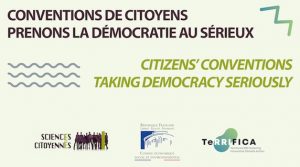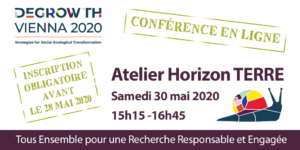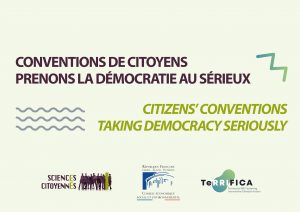- Better understand climate manipulation on a large scale juin 21st, 2022Continue reading…
As part of the citizen mobilizations of COP21 (United Nations Climate Change Conference) in 2015. Sciences Citoyennes decided to seize the matter of geo- engineering. Since then, we have participated to spreading acculturation on those controversial subjects.
SC chose to multiply formats and diffusion canals in order to make this information more accessible to everyone.
- Citizens’ Conventions, Taking Democracy Seriously juillet 2nd, 2020Continue reading…
The videos of the conference in English are online!
 The 3rd TeRRIFICA Reflective Workshop and Conference “Citizens’ Conventions, Taking Democracy Seriously” was held in Paris on October 14th and 15th 2019. The event was hosted at the Economic Social and Environmental Council (CESE) and the Fondation Charles Léopold Mayer.
The 3rd TeRRIFICA Reflective Workshop and Conference “Citizens’ Conventions, Taking Democracy Seriously” was held in Paris on October 14th and 15th 2019. The event was hosted at the Economic Social and Environmental Council (CESE) and the Fondation Charles Léopold Mayer.Sciences Citoyennes organized both activities within the framework of the H2020 TeRRIFICA project, whereby eight European institutions work together to foster competence for climate change adaptation and mitigation in different European regions with a specific focus on Responsible Research and Innovation.
- Lettre ouverte des organisations sur le mécanisme de règlement des différends entre investisseurs et États (RDIE) et le COVID -19 juin 26th, 2020Continue reading…
630 organisations de la société civile, dont Sciences Citoyennes, ont signé cette lettre ouverte alarmant les gouvernements sur une vague de plaintes COVID-19 dans des « tribunaux d’entreprise ». La lettre a été envoyée au Premier Ministre français Edouard Philippe. Retrouvez également le communiqué de presse expliquant l’initiative.
À l’endroit des gouvernements:
Aujourd’hui, nous vous invitons, par la présente lettre, à prendre l’initiative pour assurer que les pays du monde ne soient confrontés à une vague de poursuites de règlements des différends entre investisseurs et États (RDIE) en raison des mesures prises pour lutter contre la pandémie COVID-19 et la crise économique qui en découle.
Partout dans le monde, certains gouvernements prennent des mesures pour sauver des vies, endiguer la pandémie, protéger les emplois,lutter contre les catastrophes économiques et veiller à ce que les besoins fondamentaux des populations soient couverts. L’ampleur de ces mesures est sans précédent dans les temps modernes et la nécessité de ces actions est évidente. Cependant, la portée très étendue du mécanisme de RDIE pourrait exposer ces mesures gouvernementales cruciales à des plaintes avec demande d’indemnisation à hauteur de plusieurs millions de dollars de la part des investisseurs étrangers. Le nombre de ces plaintes pourrait également être sans précédent et imposer des charges financières considérables aux gouvernements qui croulent déjà sous le fardeau des crises sanitaires et économiques dévastatrices.
- Atelier Horizon TERRE en ligne le 30 mai 2020 – Workshop Horizon TERRE online on May 30th, 2020 (FR/EN) mai 26th, 2020Continue reading…
Le projet Horizon Terre, porté par les associations Sciences Citoyennes, Ingénieurs sans Frontières et le collectif Atécopol, depuis septembre 2019, vise à créer des scénarios de recherche alternatifs à ceux d’Horizon Europe (le programme cadre de recherche de l’Union Européenne) dans l’objectif de créer des synergies entre les collectifs de chercheurs et d’étudiants et in fine, de faire du plaidoyer au niveau européen et national pour contribuer à faire infléchir les politiques d’orientation de la recherche selon les axes définis par les membres du projet.

Les membres du projet vont animer un premier un évènement public de consultation sous la forme d’un atelier durant la Vienna Degrowth Conference. Cet atelier en anglais aura lieu en ligne le samedi 30 mai de 15h15 à 16h45. Animé par des chercheurs (sciences sociales et sciences expérimentales) et des experts associatifs, il s’adresse à une trentaine de participants.
- Réponse au rapport parlementaire sur les perturbateurs endocriniens dans les plastiques janvier 22nd, 2020Continue reading…
Une réponse écrite par Jérôme Santolini, chercheur en Biologie, administrateur de Sciences Citoyennes, membre de « Cantine Sans Plastique France » et coauteur du livre « Pas de plastique dans nos assiettes – des perturbateurs endocriniens à la cantine »
Il y a quelques jours, les député.es Claire Pitollat et Laurianne Rossi présentaient en grande pompe le rapport de leur mission d’information parlementaire sur les perturbateurs endocriniens présents dans les contenants en plastique. En écho aux annonces officielles et médiatiques (vidéos, articles…), le rapport souligne avec emphase l’urgence de la situation, l’ampleur de la crise sanitaire.
- Conventions de Citoyens, prenons la démocratie au sérieux – Les vidéos de la conférence sont en ligne ! novembre 6th, 2019Continue reading…
La conférence Conventions de Citoyens, prenons la démocratie au sérieux s’est tenue le 14 octobre 2019 au Conseil économique social et environnemental (CESE), dans le cadre du projet européen sur la co-création d’action contre le changement climatique, TeRRIFICA – Territorial Responsible Research and Innovation Fostering Innovative Climate Action.
 Les Assemblées citoyennes en Irlande, l’annonce par Emmanuel Macron d’une Convention citoyenne pour la transition écologique, les revendications d’organisations environnementales pour une Assemblée citoyenne face à l’urgence climatique et écologique, les promesses de démocratie par le digital… Les revendications pour que l’avis des citoyens soit au cœur des décisions politiques sont nombreuses. Mais quelle procédure de démocratie participative mettre en place ? Selon quelles conditions une telle procédure peut-elle être réellement démocratique et prendre en compte l’avis éclairé des citoyens ?
Les Assemblées citoyennes en Irlande, l’annonce par Emmanuel Macron d’une Convention citoyenne pour la transition écologique, les revendications d’organisations environnementales pour une Assemblée citoyenne face à l’urgence climatique et écologique, les promesses de démocratie par le digital… Les revendications pour que l’avis des citoyens soit au cœur des décisions politiques sont nombreuses. Mais quelle procédure de démocratie participative mettre en place ? Selon quelles conditions une telle procédure peut-elle être réellement démocratique et prendre en compte l’avis éclairé des citoyens ? - State of play EU Defence Fund: EP plenary vote on Wednesday 12 décembre 11th, 2018Continue reading…
Sciences Citoyennes est co-signataire de cette lettre ouverte aux parlementaires européens
Dear Member of the European Parliament,
on Wednesday 12 December, you will make a decisive vote on the proposal for a European Defence Fund to dedicate €13 billion for research and development projects in military technologies during the next multi-financial framework.
44 non-profit organisations across Europe have recently alerted about the risks the current proposal entails, regarding the diversion of funds from civilian priorities and the over-influence of the arms industry, as well as the possible contribution to the development of killer-robots and the future exports of EU-funded goods.
- Citizen Conventions are needed to define European research. janvier 12th, 2018Continue reading…
Europe’s next budget for research-funding could reach €120-billion for the coming seven years. The European Parliament will vote in 2019 on its allocation in the next Research Framework Programme (FP9). Once again, most of that money will be granted to multinational companies, unless…
Sciences Citoyennes and Global Health Advocates, supported by a coalition of European non-governmental organisations (NGOs), have succeeded in convincing of the need for revitalisation of European democracy. The goal can only be achieved through the political engagement of citizens.
- Scientists and Civil Society Must Move Together toward a New Science mai 18th, 2016Continue reading…
Article proposed and written by an advisory board member of Sciences Citoyennes, Christian Vélot1,2,3,4* , about democracy in science and public engagement, illustrated by a concrete example of participatory research. This is an open-access article, originally published here : http://journal.frontiersin.org/article/10.3389/fpubh.2016.00096/full.
- A Manifesto For a Responsible Scientific Research janvier 25th, 2016Continue reading…
As a result of a collective work, here is our Manifesto for a Responsible Scientific Research. Fondation Sciences Citoyennes purpose is to encourage debates concerning the scientific research aims and the means to implement individual and collective accountability in this field.
- Lettre de soutien au professeur Gilles-Eric Séralini et ses collègues / Support Letter to Gilles-Eric Séralini and his colleagues mai 5th, 2010Continue reading…
- The French salt industry in court avril 27th, 2009Continue reading…
Abstract : In 2008, the French salt industry lost a high-profile libel case brought by its agent the Comité des Salines de France against Pierre Meneton, a medical research worker. In 2002, and in 2004, France’s Food Safety Agency and National Academy of Medicine recommended that the population’s salt intake be reduced in line with worldwide dietary guidelines that had been evolving for more than 50 years.2,3 The Comité subsequently seemed to focus much of its argument against this recommendation towards Pierre Meneton, of the National Institute of Health and Medical Research, who was trying to implement national recommendations for dietary salt intake.
- Save the world and keep a career décembre 8th, 2005If the prospect of endless lab work doesn’t appeal, maybe using your qualifications to address global problems more directly would be the answer. There is plenty of scope for those who wish to pursue science with a ‘social conscience’, as Virginia Gewin finds out.Continue reading…We aim at increasing the capacity for research and expertise of civil society, NGOs, consumerists, citizen movements and trade unions. We support the establishment of a “scientific third sector” that is better able to meet the growing social and ecological demands, which are neglected by the major scientific orientations whether they be defined by the state or by private industry.
- Towards a citizens’ science in Europe : new forms of co-operation between NGOs, citizens and researchers novembre 13th, 2003Continue reading…
Scientific knowledge plays a determining role in the societal development provoking profound social, political, economic and cultural transformations. Traditionally scientific knowledge is seen as being neutral and independent but in fact it is contested and negotiated knowledge that is more and more influenced by pure economic factors and for which the economic and organisational resources are unequally distributed in the society.
- Sciences Citoyennes – a short presentation octobre 28th, 2015Sciences CitoyennesContinue reading…
Sciences Citoyennes – Citizen Sciences – is a non for profit organisation, which was created in 2002 by a group of researchers from various fields of humanities and natural sciences, by students and citizens.
Our background and our objectives
Our main issue is to critically question the role of science and technology in the construction of a society and to put science into democracy so that it serves the common good.
- Staff members and advisory board septembre 13th, 2015Sciences CitoyennesContinue reading…
An advisory board including 29 people leads the association for a citizen sciences foundation. 5 staff members are implementing different projects initiated by this board.
- Contact us mai 19th, 2015Sciences CitoyennesContinue reading…
To contact the Fondation Sciences Citoyennes:
- Our support mai 19th, 2015Sciences CitoyennesContinue reading…
The Fondation Sciences Citoyennes benefits (or benefited) from the following financial support (agreement, grants, responses to project calls…):
- Our network mai 19th, 2015Sciences CitoyennesContinue reading…
Our network
The Fondation Sciences Citoyennes belongs to several networks or collectives :
- Charta Citizen Sciences Foundation novembre 14th, 2006Sciences CitoyennesContinue reading…
Citizen Sciences Foundation : An NGO dedicated to the redistribution of the capacity for expertise and research towards citizen-movements
- Towards a citizens’ science in Europe : new forms of co-operation between NGOs, citizens and researchers novembre 13th, 2003

